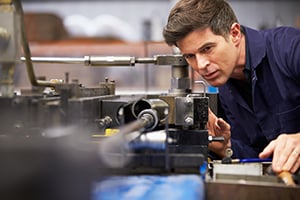Tired and outdated equipment may be impacting your small business' profits. Forbes magazine recently noted that 82% of companies have experienced at least one unplanned downtime event over the past three years, with most having suffered two or more instances. In today's hyper-competitive market, any significant amount of ceased manufacturing can result in thousands – if not hundreds of thousands – of dollars in lost revenue.
Small business owners who purchased used equipment or have grown tired of calling for service repairs should explore how new equipment may improve their company's standing and set them up for long-term success.

Capital expenditures, including those for computers, machinery and other equipment, are critical to maintaining a company's operations and ensuring its growth. For small businesses in particular, business equipment purchases can yield significant benefits.
Technology, engineering and manufacturing trends change frequently. Working with equipment that's five or more years old can put small businesses at risk of losing their competitive edge. Investing in new equipment and leading-edge technologies enables companies to be more agile and responsive as business needs change and consumer habits shift.
Your employees are a crucial factor in your business' success. In today's work environment, business owners must consider their employees' job satisfaction and if they feel well-equipped to perform the tasks they were hired to do. It's estimated that employees wait 21 days a year on passé technology – that's a significant amount of time that could be used in outlining strategy and developing new go-to-market plans.
Whether through innovative manufacturing processes, dependable company vehicles, secure technology or streamlined communications, investing in equipment is worth considering.
Older equipment, even when well-maintained, can present safety risks. If an employee is injured on the job, significant expenses could be incurred due to worker's compensation and other costs.
Workplace safety also encompasses more than the physical safety of employees. Outdated equipment, including computers and servers, can leave companies at greater risk of theft, damage, security breaches and cybercrime.
The new equipment will likely incorporate more sophisticated technology, security controls and anti-theft features. Depending on the equipment, it may employ packaging or specific materials that help reduce the risk of damage from environmental factors.
Some companies choose to lease rather than buy new equipment. Among the drawbacks of this option is that companies are at the mercy of the leasing company. They can only make updates or changes to the equipment when needed if the leasing company permits it. Small business owners may have to wait on the leasing company to provide needed maintenance.
When a small business owner purchases their own equipment, they can make changes when necessary. The equipment can be sold if it outlives its service to the business, and the business also doesn't have to abide by a leasing company's rules.

Small business owners may enjoy significant government tax incentives for capital equipment purchases if they buy (or lease) new equipment under Section 179. Under the Section 179 deduction, small business owners may write off all or part of qualifying equipment or property during the year it was purchased and used within annual limitations, making new equipment completely tax deductible.
This potential tax break contrasts with years past when equipment purchases were written off in increments over time as depreciation. Be sure to speak with your tax professional about options for your equipment assets.
Older equipment has likely outlived any warranty and guarantee of support. Once a piece of equipment has reached this stage, businesses risk downtime or complete outage due to outdated or obsolete parts, which can be extremely costly. New equipment typically comes with warranties, parts replacements and vendor support.
Investing in new equipment is a significant undertaking for companies of all sizes, and it can be especially precarious for small businesses. Before buying equipment for your business, business owners and stakeholders should assess their business needs and resources and review their options.
For small business owners who decide that buying new equipment is the way to go, there are numerous decisions to be made. Equipment capabilities, lifespan, warranties and maintenance needs must be researched before moving forward.
There's also the question of how to pay for the equipment. A dedicated banking professional with deep knowledge of your industry can present several equipment financing options, such as a business line of credit, a term loan or an equipment loan for your small business and help you select the right option for your specific needs.
Topics: Grow Your Business, Real Estate
Are you interested in contacting a local, Florida banker to discuss your individual financial needs? We’d love to speak with you. Schedule a consultation today.